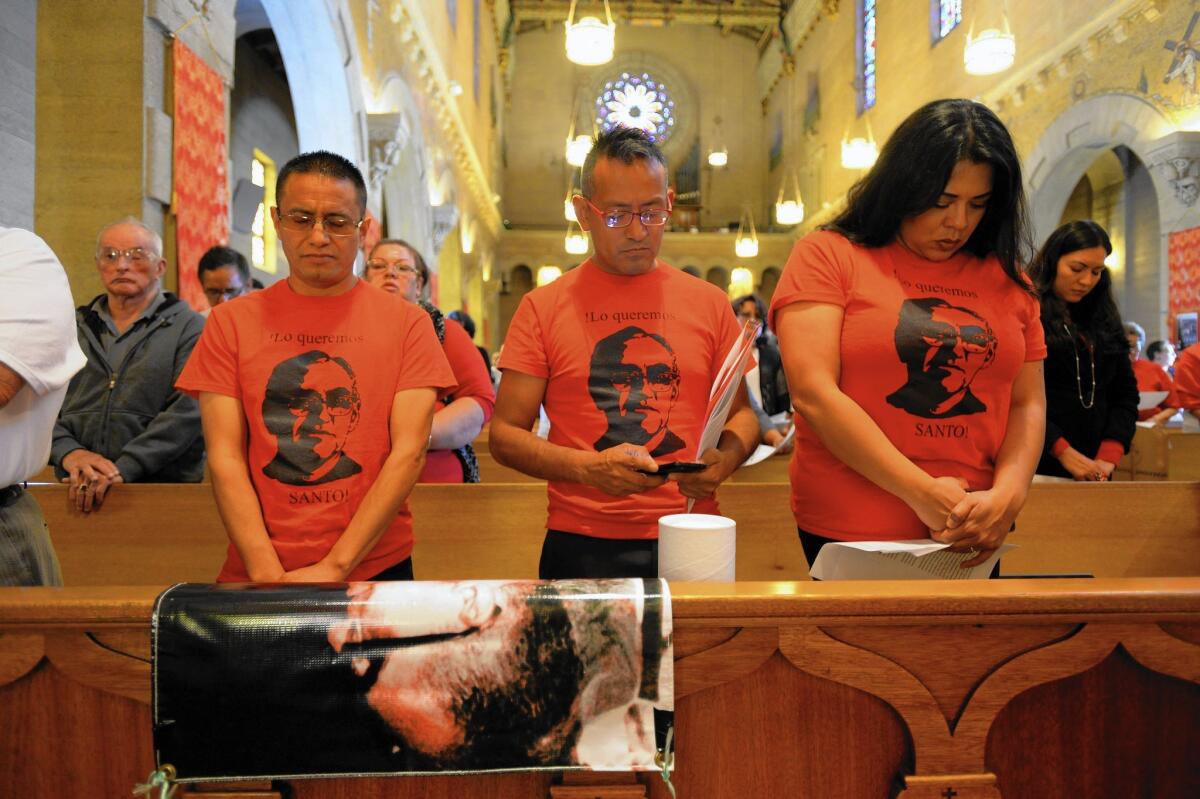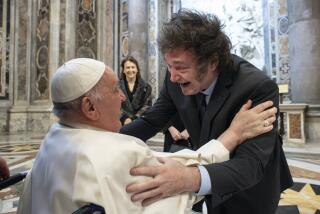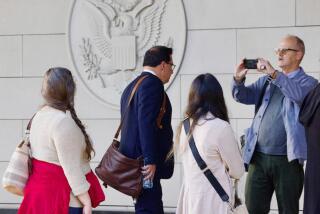Salvadoran Angelenos celebrate Archbishop Oscar Romero’s beatification

Carmen Sanchez fought back tears as she waived her tiny Salvadoran flag in MacArthur Park.
“I’ve waited for this day a very long time,” the Westlake resident said. “Finally, this person who sacrificed everything for his pueblo will get the recognition he deserves.”
On Saturday, she joined a crowd of Salvadorans in observing the beatification of Archbishop Oscar Romero, a ceremony that puts one of Latin America’s most cherished and controversial religious figures one step closer to becoming a Catholic saint.
The canonization of Romero, who was assassinated by a right-wing death squad as he performed Mass 35 years ago, was long resisted by conservative forces in Central America and the Vatican. Some asserted that Romero’s advocacy for the poor was driven by his leftist politics.
But Pope Francis, the first pontiff from the Americas, swept aside doubts and in February declared Romero a martyr, immediately clearing the way for his beatification.
While tens of thousands of people from Latin America and beyond poured into El Salvador to celebrate, here in Los Angeles, Salvadorans gathered for a church service in Romero’s honor, followed by a procession to his statue in the park.
Their joy, however, was tempered by distress over the situation in their homeland — ravaged by poverty, crime, gang violence and police crackdowns.
Sanchez, 48, said she hoped Romero’s sainthood, coming more than 20 years after the civil war ended, would encourage Salvadorans living abroad to unite and push for change.
Those who attended the service at Precious Blood Catholic Church came full of emotion and memories.
Photos of Romero — posing with farmworkers, children and fellow priests — lined the base of the altar. Clerics and community members took turns reading samples of the archbishop’s final homilies and writings. They sang songs recounting his commitment to the poor, despite persistent death threats.
Ricardo Parada, 54, sat three rows back. The elementary school teacher was baptized by Romero in the early 1960s, when he was a priest in the town of San Miguel.
“Can you imagine?” Parada said. “To be baptized by a saint? It feels like I can almost touch heaven.”
Parada was 18 when the archbishop was slain. Soon after, seven of his own relatives were killed. Years later, he named his son Arnulfo, honoring Romero’s middle name.
“This is a day of great hope and faith,” Parada said. “Msgr. Romero left his light when he died. And today that light shines brighter than ever to denounce the injustice our country is seeing.”
Among the speakers was Mario Martinez, who worked with Romero in his final years, reaching out to churches in small towns across El Salvador. He shared a few stories about the man who came to be known as the “voice of the voiceless.”
“He was someone who never considered himself important,” said Martinez, 75. “He’d pack himself a few sandwiches and a thermos full of juice and head into the pueblos to do his work. When we got hungry, he’d eat with us on the floor by the side of the road.”
As those celebrating made their way to MacArthur Park, they held up large images of Romero and shared stories about him. Many were teenagers when he was killed, and they had heard the news on the radio or at school. Some attended his funeral, where snipers fired on the crowd, killing as many as 40 mourners.
“We’ve gone through so much to get here. We’re tired,” said Raquel Hernandez, 55, who fled to the United States a few years after Romero’s death. “I hope as soon as he is made a saint, he will go straight to God and ask him to please, finally bring peace to El Salvador.”
esmeralda.bermudez@latimes.com
Twitter: @LATbermudez
More to Read
Start your day right
Sign up for Essential California for news, features and recommendations from the L.A. Times and beyond in your inbox six days a week.
You may occasionally receive promotional content from the Los Angeles Times.







